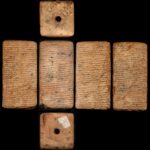The Kesh Temple Hymn is the oldest piece of literature ever found, dating back to around 2600 BC/BCE. Stop and think about that for a moment – many people today consider a literary work “old” if it pre-dates themselves, but this poem pre-dates almost everything that has ever been written by human hands. Many of the first students who ever learned to write had to copy this poem onto their clay tablets to prove that they had mastered their craft. Those students lived at a time when the Great Pyramids of Giza were a quarry full of limestone and a dream! It’s an absolute privilege that we are able to read these words and even see some of those tablets thousands of years later.
(The Kesh Temple Hymn inscribed on clay tablets, c. 1800-1600 BC/BCE. Image by The Walters Art Museum. Click to see full-size.)
I invite you to read the poem in translation for yourself and maybe even to view it in phonetic Sumerian before reading my further thoughts, but that’s up to you. The link to the translation also includes a very insightful explanation of the hymn and its contents by Joshua J. Mark for the World History Encyclopedia.
The first thing that struck me upon reading this poem was how similar it is to hymns and worship songs of today. Each verse, if we can simplify things by calling them that, begins with a repeated line or two that emphasizes something laudable about the Kesh Temple, and ends with a sort of chorus of three questions: “Will anyone else bring forth something as great as Kesh? Will any other mother ever give birth to someone as great as its hero Acgi? Who has ever seen anyone as great as its lady Nintud?” Interestingly, the poem ends with a seeming contradiction that could also be interpreted as wordplay: “Draw near, man, to the city, to the city – but do not draw near! Draw near, man, to the house Kesh, to the city – but do not draw near!” Even today, religions encourage worshippers to draw near to the object of worship, but don’t try to get so familiar with divinity that you fail to show the proper respect.
The Instructions of Shuruppag were written some time later than The Kesh Temple Hymn, but it is still considered one of the oldest (if not the oldest) surviving works of philosophical literature. In it, Shuruppag gives advice to his son Ziudsura, who is believed to be the hero of the Mesopotamian story of the Great Flood. If you have heard the biblical tale of Noah from the Book of Genesis, you know the story of Ziudsura (or Atrahasis or Utnapishtim, since his name varies from one telling to another), and if you are familiar with the biblical Book of Proverbs, you will recognize the format of these pearls of wisdom. In fact, it is believed that The Instructions of Shuruppag inspired the Book of Proverbs, although the wisdom offered in one greatly differs from the wisdom offered in the other.
You can read The Instructions of Shuruppag in translation here and in phonetic Sumerian here.
Some of these proverbs are actually pretty funny, such as “14: You should not buy a donkey which brays; it will split your midriff” and “49: You should not have sex with your slave girl: she will chew you up.” There’s a lot about slave girls and general misogyny in here, but I guess that’s to be expected given the time period. However, some of this advice still managed to speak to me: “44: You should not scatter your sheep into unknown pastures” could be applied as a metaphor to various aspects of life. “67: You should not boast in beer halls like a deceitful man” and “126: You should not pass judgment when you drink beer” have always been wise words to live by. “202-203: A loving heart maintains a family; a hateful heart destroys a family” will always be true. And “242-243: Nothing at all is to be valued, but life should be sweet. You should not serve things; things should serve you” resonates hard with me right now.
Overall, I enjoyed my time with these ancient literary works. What about you? Do you have any thoughts to share about either of these works? Please share them below.
I plan to post an update about my Sumerian studies next Friday, and the Friday after that I will post about The Epic of Gilgamesh, the oldest surviving epic poem in the world. Until then, happy reading!
